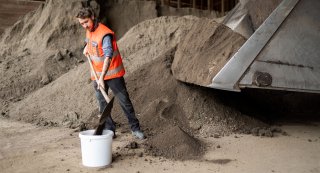Basic characterisation of excavated material

Our Services
- Collection of the necessary information pursuant to section 4 of the Landfill Regulations
- Preparation of a sampling plan
- Sampling in accordance with standards, e.g. of
- Excavated material prior to excavation (in-situ) and after excavation (ex-situ)
- Designated areas in accordance with the Remediation of Contaminated Sites Act (Altlastensanierungsgesetz, or ALSAG)
- Material excavated for tunnels
- Material excavated for rail tracks
- Other non-recurring waste
- Waste flows
- Recurring waste
- Mechanical and biological plant (MBA) material
- Waste chemical assessment (basic characterisation)
- Excavation supervision (waste chemical supervision) incl. excavation
- Appropriate, environmentally friendly recycling and disposal of excavated material and waste
Your benefits
- Compliance with legal requirements (Landfill Regulations (DVO), Federal Waste Management Plan, Recycling of Building Material Regulations)
- Budget certainty thanks to prompt cost planning
- Money saved, e.g. by limiting potential contamination
- Numerous sustainable recycling options including subsoil backfilling and recultivation
- Highly cost-effective
- Accredited and independent testing and inspection
- All from a single source
You want to use our service?
We are looking forward to your enquiry!
Frequently asked questions
The Remediation of Contaminated Sites Act (Altlastensanierungsgesetz, or ALSAG) is the legal basis for funding the clean-up of contaminated sites. The charge for contaminated sites is collected by the relevant customs offices. Among other things, the charge for contaminated sites covers the disposal of waste as landfill, the incineration of waste, the storage of waste prior to removal and disposal as landfill, and the export of waste.
Yes, but there is a quantity threshold below which analytical testing is not necessary. Article 13(1)(3) of the Landfill Regulations (Deponieverordnung, or DVO) lays down specific rules for uncontaminated excavated soil. If the total weight of excavated waste soil generated by a construction project does not exceed 2,000 tonnes, no analytical tests are required. However, it must be confirmed that no obvious contamination was observed during excavation and there is no evidence of contamination. Soil excavated from different construction projects must not be mixed.
A landfill site is a structural and technical facility whose aim is to minimise the environmental impact of waste disposal. Austria has the following types of landfill sites:
- Excavated soil landfills
- Inert waste landfills
- Non-hazardous waste landfills
- Demolition waste landfills
- Residual material landfills
- Mass waste landfills